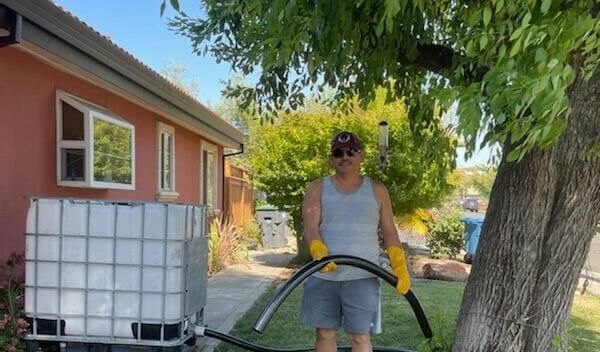On Sept. 20, the Healdsburg City Council unanimously adopted a $45 per delivery fee for the city’s residential recycled water delivery program, which will either come to an end on Nov. 5 or Nov. 19.
The opt-in fee will go into effect starting Oct. 4. Customers who are currently enrolled in the city’s low-rate utility CARE program will be exempt from delivery fees.
At a city council meeting earlier this month, the council directed city staff to come up with a participation fee for the widely popular residential recycled water program, which the city is currently paying for.
And while some residents expressed concern that a program fee may prompt some people to drop out of the program and resume watering with regular potable water, city staff stressed that unless the council wants to take funds from another vital program and put it toward recycled water, the council will have to turn to implementing a program fee in order to recover costs.
“My initial reaction to this was ‘no, don’t charge, let’s just get through another month,’ but when I look at the numbers and the dollar amount I have to take pause. How can we really have the city commit that much more money at this point?” said Healdsburg Mayor Evelyn Mitchell.
The program, which has been free for all residents, has cost the city over $365,000.
The program has around 1,059 participants and the cost averages out to roughly $45 per delivery.
While the program has associated administrative fees, Healdsburg Utility Director Terry Crowley said hauling the water from the recycled water plant on Foreman Lane to the over 1,000 participants in town is the most cost heavy aspect of the program
“The largest portion of the costs are the costs to haul water, that’s really the bulk of the costs and we need to identify how to recover those costs in the next weeks,” Crowley said during the Monday meeting.
Weekly hauling costs are around $45,000 and while nearly $440,000 in American Rescue Plan Act funds were appropriated by the council for the program, it only covers project costs through the week of Sept. 24.
The $45 per delivery fee will be incorporated into customer utility bills at the end of the program and customers can drop out of the program, with a 48-hour notice, at any time.
According to the agenda item report, “To confirm participation under the fee structure, each participant will need to sign and return a confirmation form. This form will be distributed by mail and posted on the city’s website. Once the city receives program confirmation from participants, those participants will be secured in the delivery schedule until either the program end date or a customer chooses to exit the program.”
Resident Brian Geagan said he would be more than willing to pay the $45 for the program, however, local Tim Unger thought the entire subject should be tabled until the city can think of a better financing method.
“This life giving and challenging issue many believe needs thoughtful, long term planning including creative financing,” Unger said. “Water will continue to be the rare and scarce commodity in our region. So will the usage of recycled water for trees, gardens, parks and our athletic fields. The primary considerations to delay a vote are as follows: The significant water usage reduction was only possible because the community stopped watering lawns and reduced watering gardens. For that to occur, residents had to invest in tanks and pumps at a cost ranging from $500 to $2,000. If the city introduces a fee it assumes the risk that customers will avoid the fee and resume watering their trees and gardens with potable water. The argument could be made that the delivery cost should be borne by all residents. Keeping the city green is in everybody’s personal interest.”
Another resident opined that the developers behind the Montage and the Mill District should pay for the program and “buy some good will” with the community.
Councilmember Ariel Kelley recognized that it is challenging to have to consider starting a fee for a program that’s led to large strides in overall city water savings.
“I feel like this is such a challenging decision before us because we know what incredible water savings has happened with the implementation of the program and the work that our community has done to help us achieve that. At the same time, we know we spent half a million dollars so far on this program and we’re looking at another few hundred thousand continuing forward,” Kelley said.
At the Sept. 7 city council meeting, the council also decided to close the program to new participants after Sept. 17, and decided to end the program on Nov. 5, or on Nov. 19 if the city does not receive any rain by early November.
While the area received a sprinkling of rain over the weekend, Lake Mendocino is only at 25% of its target water supply with only 16,995 acre-feet.
According to Healdsburg City Manager Jeff Kay, the city’s water conservation levels citywide are holding steady at 44%.








